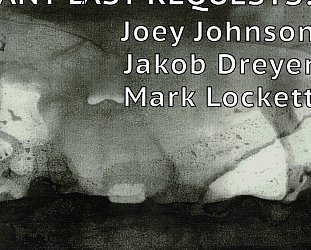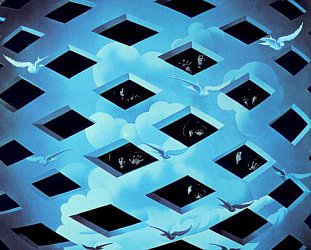Graham Reid | | 3 min read
Duke Ellington: Blues for New Orleans (1970)

The cartoon shows two old guys in the television room of a resthome. One says, "There's nothing left to live for."
The other replies, "Yeah, there is. I'm watching the Ken Burns’ series on jazz and want to find out how it turns out."
The joke - if there is one - is we all know how jazz turned out: the once universally popular music divided and subdivided into factions so that today the word "jazz" is effectively meaningless as a definition. Although the music is still alive, and every historical style is still played somewhere, that's how jazz turned out: a house divided.
The other, and somewhat more subtle part of that cartoon - especially for those who have seen Burns' documentary - is that the 10-episode series doesn't tell you how jazz turned out.
The series, which won an Emmy award, pretty much leaves its subject in the early Sixties - the final episode hurriedly encompassed 1960 to the present - so around half the history of this music, the most complex part, is barely acknowledged.
And because what precedes that episode is so insightful, lively, thorough and enjoyable, that is a major disappointment.
Jazz doesn't “turn out“.
There are other quibbles too. The series' "senior creative consultant" Wynton Marsalis drove the agenda from his neo-conservative perspective and commands too much screen time; musicians such as Sonny Rollins, Ornette Coleman and Joe Henderson could, and should, have been interviewed; there are startling omissions as well as several musicians who don't get enough attention (Bill Evans, Charles Mingus, Stan Getz, Cecil Taylor are cruelly and unfairly dismissed with no right of reply); and so on.
But in the grand swathe Jazz cuts - and it is grand, and it does cut it - the early music is well represented.
What Burns and his crew did was compile 2400 still photographs, more than 2000 film excerpts, and dozens of interviews to create a sense of what jazz was all about.
And they allowed the music to be placed back into its historical context, which, oddly enough, seemed to make it more relevant than ever.
When Dave Brubeck weeps about seeing, as a child, the wounds on a black worker on his father's farm you feel the past seep directly into the present. At such times, and they are frequent and necessary, Jazz rises beyond being about music into something much more ambitious. It, as with Burns’ similarly conceived film history and meditation on baseball, is about American life.
The complete series is available as four nicely packaged boxed DVDs and, despite its faults, deserves to be in any serious music collection. And anyone interested in the social history of America in the first and formative half of last century should see it.
Race is the context from which this music emerged, and in turn the music reflected social change.
You quickly understand why critic Leonard Feather considered jazz America's classical music. It encompassed every human emotion and aspiration, and artists as towering as Louis Armstrong and Duke Ellington could assimilate all that and send it back into the world in memorable music.
Burns and his team bring to life the stories of these greats. Armstrong is given his due as an innovator and builder of bridges between races and cultures in a world that today seldom sees him as little more than an Uncle Tom who sang Hello Dolly and Wonderful World.
There's the tragic life of the genius Charlie Parker; Ellington as a difficult, emotional, workaholic hero; Brubeck as someone deeper than his audience.
There are many -- too many -- stories of talent squandered, of genius only briefly realised. Here is "the troubled daughter of a Baltimore housemaid whose distinctive singing transcended the limitations of her own voice and routinely transformed mediocre into great art". Her name was Billie Holiday and the final images of her are steeped in sorrow.
Yes, it's a measure of how extraordinary this series is that even after its 17 hours have run their course there is still disappointment at the incompleteness of the project.
But maybe Burns is right, that today jazz is a Tower of Babel from which civilians and their appreciation of this music - and its rich, diverse history - have been frightened off by the clouds of dust from critics.
Burns and his team have blown away the clouds and the critics, and have let the story of the music speak for itself and its songs heard anew.
It is full of engaging personal stories (of sometimes less-than-engaging characters) and of course endlessly inventive music and musicians.
As Time magazine's Jay Cocks said, "Jazz is great television about great music." And on DVD it can get the freeze-frame, rewind and repeat-plays it deserves.
And because this music is alive today, jazz will just carry on. It'll be interesting to see how it turns out.





post a comment